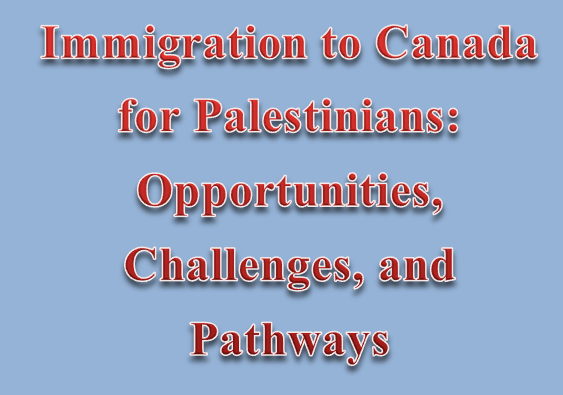Canada has long been known for its multicultural society, humanitarian values, and welcoming immigration policies. For Palestinians, who often face displacement, limited opportunities, and political instability, Canada represents a beacon of hope. The Canadian immigration system offers various pathways that Palestinians can pursue, whether for safety, better economic prospects, or educational opportunities. This article explores the available immigration programs, the specific challenges Palestinians might face, and how Canada’s policies align with the needs of Palestinian applicants.
Why Canada?
Canada ranks consistently among the top destinations for immigrants due to its high standard of living, access to healthcare and education, and commitment to human rights. For Palestinians, especially those living in areas with ongoing conflict such as Gaza, the West Bank, or refugee camps in neighboring countries, the chance to start anew in a peaceful and supportive environment is deeply appealing.
Canada’s immigration policies are designed to attract skilled workers, reunite families, and protect refugees. Its robust settlement support programs also ensure that newcomers receive assistance in language training, job searching, and integration into society.
Pathways to Immigration
1. Economic Immigration Programs
Canada operates a number of economic immigration streams, many of which are accessible to Palestinians:
-
Express Entry System: This points-based system is the primary pathway for skilled workers. It includes the Federal Skilled Worker Program, the Federal Skilled Trades Program, and the Canadian Experience Class. Applicants are assessed on factors such as age, education, work experience, and language proficiency (in English or French). Palestinians with higher education and work experience in in-demand occupations stand a good chance if they meet the minimum requirements.
-
Provincial Nominee Program (PNP): Each province and territory in Canada (except Quebec) can nominate individuals based on local labor market needs. A Palestinian applicant with skills needed in a particular province may receive a nomination, which significantly boosts their chances of permanent residency.
-
Atlantic Immigration Program (AIP): This program targets workers and international graduates who want to live in Canada’s Atlantic provinces. It may be particularly relevant for Palestinians who can secure a job offer from an employer in one of these provinces.
2. Family Sponsorship
Canada places strong emphasis on family reunification. Canadian citizens or permanent residents can sponsor close family members, including spouses, children, parents, and grandparents. For Palestinians with family members already in Canada, this is a viable and often less complicated path to immigration.
3. Refugee and Humanitarian Programs
Many Palestinians qualify under Canada's refugee and humanitarian immigration streams:
-
Refugee Resettlement: Canada resettles refugees through both government-assisted and privately sponsored programs. Palestinians registered with the United Nations Relief and Works Agency (UNRWA) or the United Nations High Commissioner for Refugees (UNHCR) may qualify if they are outside their home country and unable to return due to well-founded fears of persecution.
-
Private Sponsorship of Refugees (PSR): Canadian citizens and permanent residents can privately sponsor refugees. Palestinian refugees who are known personally to sponsors or are recommended by community organizations may benefit from this path.
-
Humanitarian and Compassionate Grounds: This is a discretionary option for those already in Canada without legal status but who face serious hardship if returned to their home country. While harder to access from abroad, it has been used by some Palestinians in exceptional circumstances.
Challenges Facing Palestinian Applicants
Despite the openness of Canada’s immigration policies, Palestinians often face unique obstacles:
1. Documentation and Legal Identity
One of the most significant challenges is documentation. Many Palestinians, especially those in refugee camps, lack proper identification or travel documents recognized internationally. This can hinder the visa application process and delay background checks.
2. Travel Restrictions and Mobility
Due to restrictions in Gaza and parts of the West Bank, as well as limitations on Palestinian passport holders, it can be difficult for applicants to leave their countries of residence for interviews, biometric appointments, or even to fly to Canada once approved.
3. Financial Barriers
Many immigration pathways require proof of financial stability or the ability to support oneself and dependents. For refugees and those living in economically disadvantaged conditions, meeting these financial thresholds can be a major hurdle.
4. Political and Bureaucratic Complexities
Political instability and bureaucratic inefficiencies in Palestinian territories and neighboring countries may delay or complicate the collection of required documents, background verification, and communication with immigration officials.
Support Available for Palestinian Immigrants
Once in Canada, Palestinian immigrants and refugees can access a wide range of support services:
-
Settlement Services: These include language classes, job search assistance, housing support, and orientation to Canadian society. Many NGOs and community organizations provide culturally sensitive support tailored to Arab and Palestinian newcomers.
-
Community Networks: Canada is home to a growing Palestinian diaspora. Community centers, mosques, and cultural associations often help new arrivals find their footing and establish a sense of belonging.
-
Legal Aid and Advocacy: Several legal aid organizations offer services to help refugees and immigrants navigate the Canadian legal and immigration systems.
Success Stories and Contributions
Palestinians who have immigrated to Canada have made significant contributions to Canadian society in various fields such as academia, medicine, entrepreneurship, and the arts. Their resilience and adaptability, often forged through hardship, make them valuable members of the multicultural Canadian fabric.
One notable example is Dr. Izzeldin Abuelaish, a Palestinian physician and peace advocate who immigrated to Canada after the tragic loss of his daughters in Gaza. He went on to teach at the University of Toronto and founded a peace foundation, becoming a symbol of hope and perseverance.
Conclusion
Immigrating to Canada offers Palestinians a chance at stability, opportunity, and a brighter future. While the journey is not without its obstacles—ranging from legal documentation to geopolitical barriers—Canada’s comprehensive immigration system provides multiple avenues for those seeking a new life.
For Palestinians who are determined, prepared, and supported by communities both in Canada and abroad, the dream of immigration can become a reality. In turn, Canada benefits from the diverse experiences, talents, and perspectives that Palestinians bring, strengthening its multicultural identity and humanitarian legacy.
